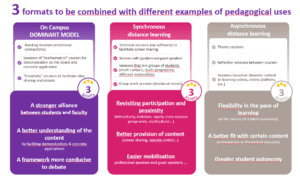Press release
NEOMA Business School unveils new hybrid course structure
Published on 08 April 2022 by NEOMA
NEOMA Business School has announced a new approach to teaching and learning, revisiting the classroom set-up and the role of the teacher, with updates including great interaction and a more personalised learning experience.
These elements were identified as the cornerstones of student and faculty expectations when it comes to building a course following the school’s recent Neopedagogy survey, which revealed what worked well in terms of teaching and learning processes implemented during the pandemic. Survey data was drawn from interviews with more than 140 professors and students currently at NEOMA.
Thanks to this study, new learning models based on three formats have been established: face-to-face, synchronous distance and asynchronous distance. They will be implemented at the start of the academic year 2022.
As part of these updates, innovative course re-designs include a greater amount of hybrid online and in-person teaching. NEOMA’s educational technicians are restructuring curriculums to incorporate interactive activities such as games, debates, talks from experts outside of faculty, and more.
Face-to-face tutoring will be prioritised, but the school intends to capitalise on its virtual reality campus as part of a scheme to teach students how to manage team relationships online.
“Distance learning prepares students for what they will experience in the workplace, where knowing how to manage and work remotely with a group has become an essential skill more than ever,” says Delphine Manceau, Dean of NEOMA.
The virtual campus is now being used in all courses, with 10,000 avatars that have already been created. Students are also being given a greater degree of control in how fast their course progresses, to match their individual learning requirements. These changes come as Europe begins to transition out of travel restrictions, and many other business and higher education institutions will seek to understand what lessons can be learned from the COVID-19 pandemic.
Conducting preliminary surveys like this will be vital to ensuring student and faculty satisfaction with any changes that are made to courses in future.





